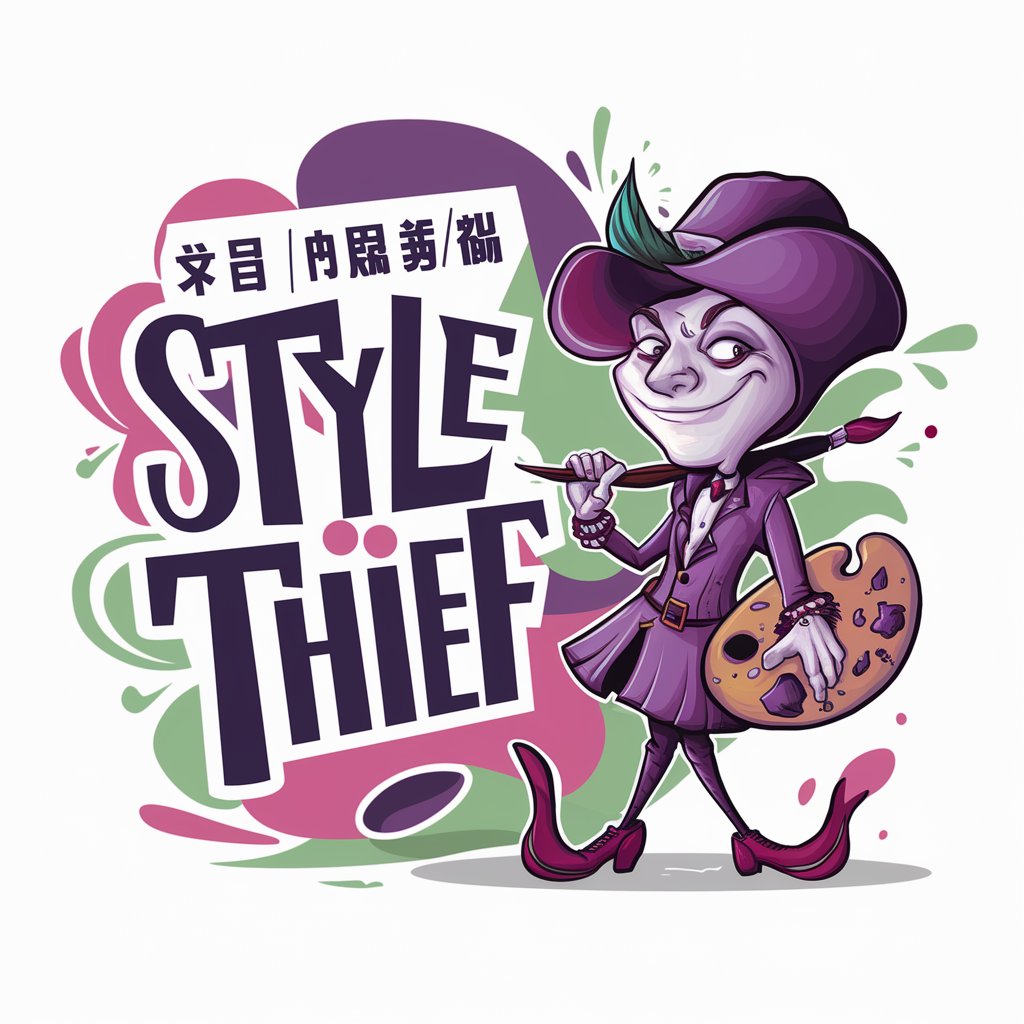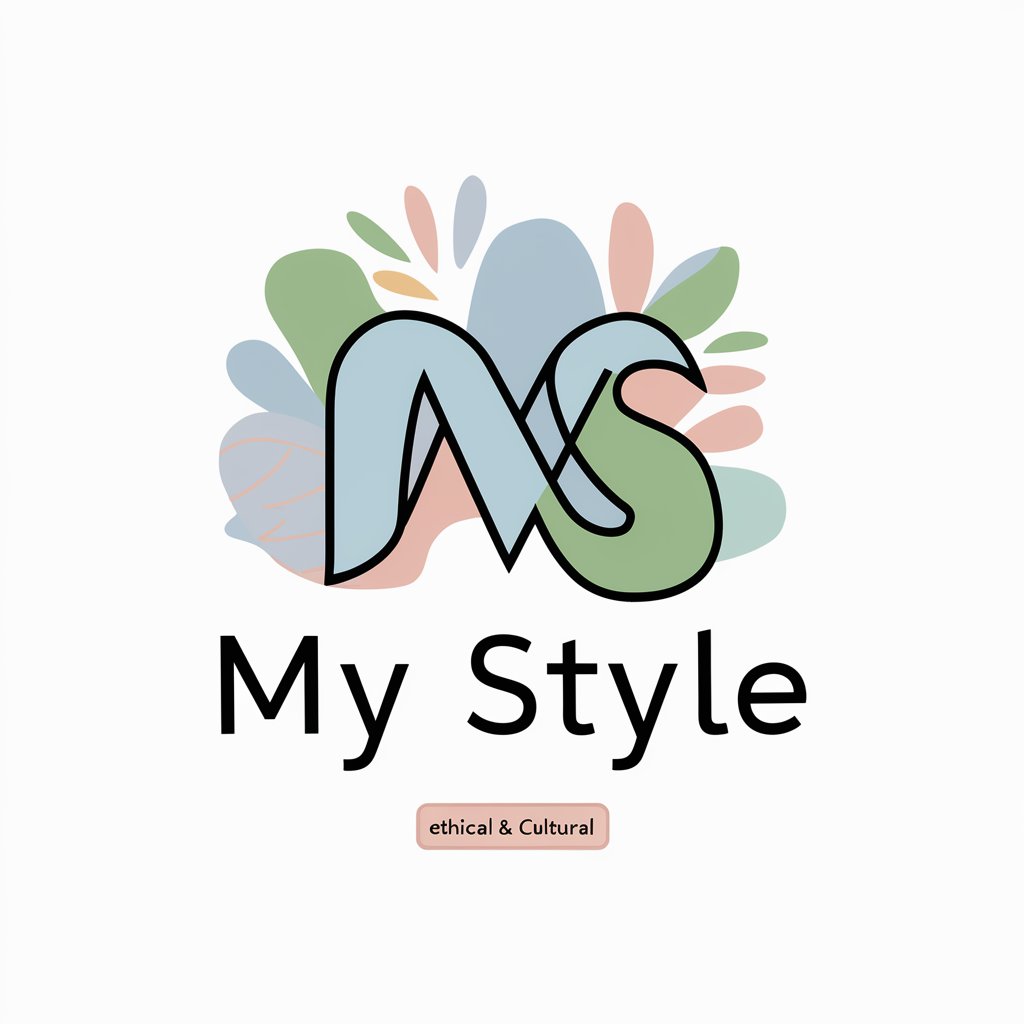
スタイル泥棒 / Style Thief - Art Style Analyzing AI

おい、どの画像のスタイルを盗むんだ?ヒヒヒ!
Discover Art Styles with AI-Powered Analysis
どの画像からスタイルを盗んで欲しいんだ?
どんな画風を探しているんだ?
新しいスタイルが必要かい?どれを見せてくれる?
今日はどの画像のスタイルを頂こうか?
Get Embed Code
スタイル泥棒 / Style Thief Overview
スタイル泥棒, or Style Thief, is a specialized AI tool designed to analyze and replicate art styles from provided images. Unlike standard image analysis tools, Style Thief focuses exclusively on the artistic style of an image, disregarding the subject matter. It's created for users who wish to understand or recreate specific art styles, providing a playful and unique approach to art analysis. Style Thief operates by extracting stylistic elements like color palettes, brushwork, and textural patterns, then translates these elements into descriptive prompts that can be used to generate similar styles in new artworks. For instance, if provided with a Van Gogh painting, Style Thief would analyze and describe his characteristic swirling brushstrokes and vibrant color use, without focusing on the painting's subject. Powered by ChatGPT-4o。

Key Functions of スタイル泥棒 / Style Thief
Art Style Analysis
Example
Analyzing a Monet painting to describe its impressionistic style.
Scenario
An art student uploads a Monet painting. Style Thief identifies and describes the impressionistic brushstrokes and light color palette, aiding the student in understanding and replicating Impressionism.
Style Replication Guidance
Example
Providing a prompt for digital artists to recreate a specific style.
Scenario
A digital artist uploads a Cubist artwork. Style Thief generates a descriptive prompt focusing on Cubism's geometric shapes and fragmented forms, which the artist then uses to guide their own Cubist-inspired creation.
Educational Tool
Example
Teaching about different art movements and their characteristics.
Scenario
An art history class uses Style Thief to analyze various paintings. The AI describes each style, enhancing students' understanding of different art movements, such as Renaissance, Baroque, and Modernism.
Ideal User Groups for スタイル泥棒 / Style Thief
Art Students and Educators
Art students can use Style Thief to better understand the characteristics of different art styles, while educators can incorporate it into teaching materials to demonstrate these styles more vividly.
Digital Artists and Designers
Digital artists and designers can use Style Thief to gain inspiration or guidance for replicating certain art styles in their work, aiding in creative processes and project development.
Art Historians and Enthusiasts
Art historians and enthusiasts can employ Style Thief as a tool to explore and discuss the nuances of different art movements and artists' styles, deepening their appreciation and understanding of art history.

Using スタイル泥棒 / Style Thief: A Step-by-Step Guide
Step 1
Visit yeschat.ai for a free trial without login, also no need for ChatGPT Plus.
Step 2
Upload an image whose art style you wish to analyze.
Step 3
Specify your request or inquiry related to the art style of the uploaded image.
Step 4
Receive a detailed analysis of the art style, presented in a playful and humorous manner.
Step 5
Use the provided information for educational, artistic, or personal enrichment.
Try other advanced and practical GPTs
BarBot AI
Mix, Shake, and Stir with AI Precision

Aquarius Insight
Unlock Aquarius Secrets with AI

DX講師 あさひ
Empowering DX Success with AI Insights

WhiplashGPT
Unleash Potential with AI-driven Intensity

沖縄料理ナビ
Discover Okinawa's culinary secrets, powered by AI.

Tech Tutor
Empowering Your Engineering Endeavors with AI

TeenygradGPT
Simplifying Neural Network Coding with AI

Constitutional Insight GPT
Empowering Constitutional Understanding with AI

Wedding Planner
Your AI-Powered Wedding Planning Companion

基督山恩仇录
Bringing Literary Classics to Life with AI

Marine Corps Historian
Unlocking Marine Corps history with AI

夕食ナビゲーター
Elevate Your Dinner with AI

Frequently Asked Questions about スタイル泥棒 / Style Thief
What types of images can スタイル泥棒 analyze?
スタイル泥棒 can analyze a wide range of images, focusing specifically on their art style, be it digital art, classic paintings, or contemporary designs.
Can スタイル泥棒 create art in the analyzed style?
No, スタイル泥棒's primary function is to analyze and describe art styles, not to create new artwork.
Is スタイル泥棒 suitable for educational purposes?
Yes, it's perfect for art education, helping students understand different art styles and techniques.
How accurate is スタイル泥棒's analysis?
The analysis is highly informed, though subjective interpretations of art styles may vary.
Can スタイル泥棒 identify the artist of a work?
No, it focuses solely on the style, not on identifying the artist or the artwork.





